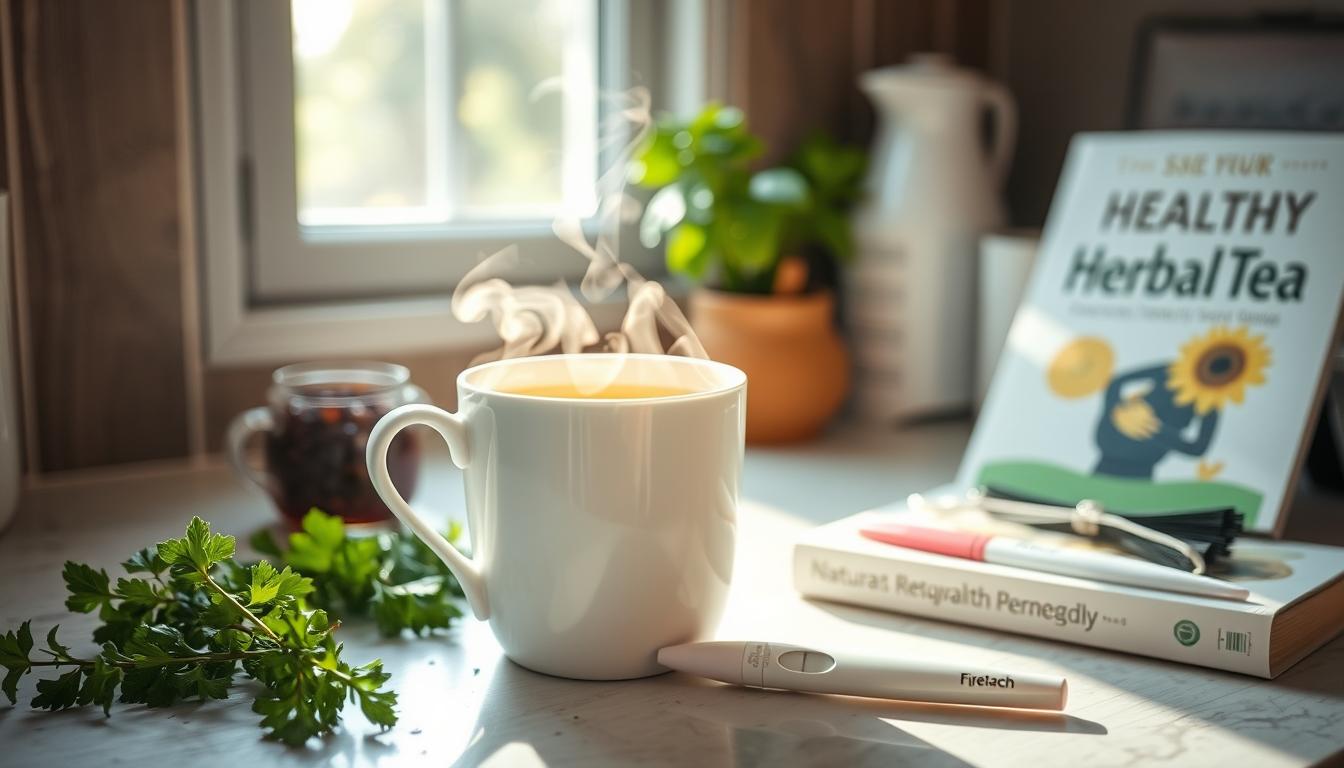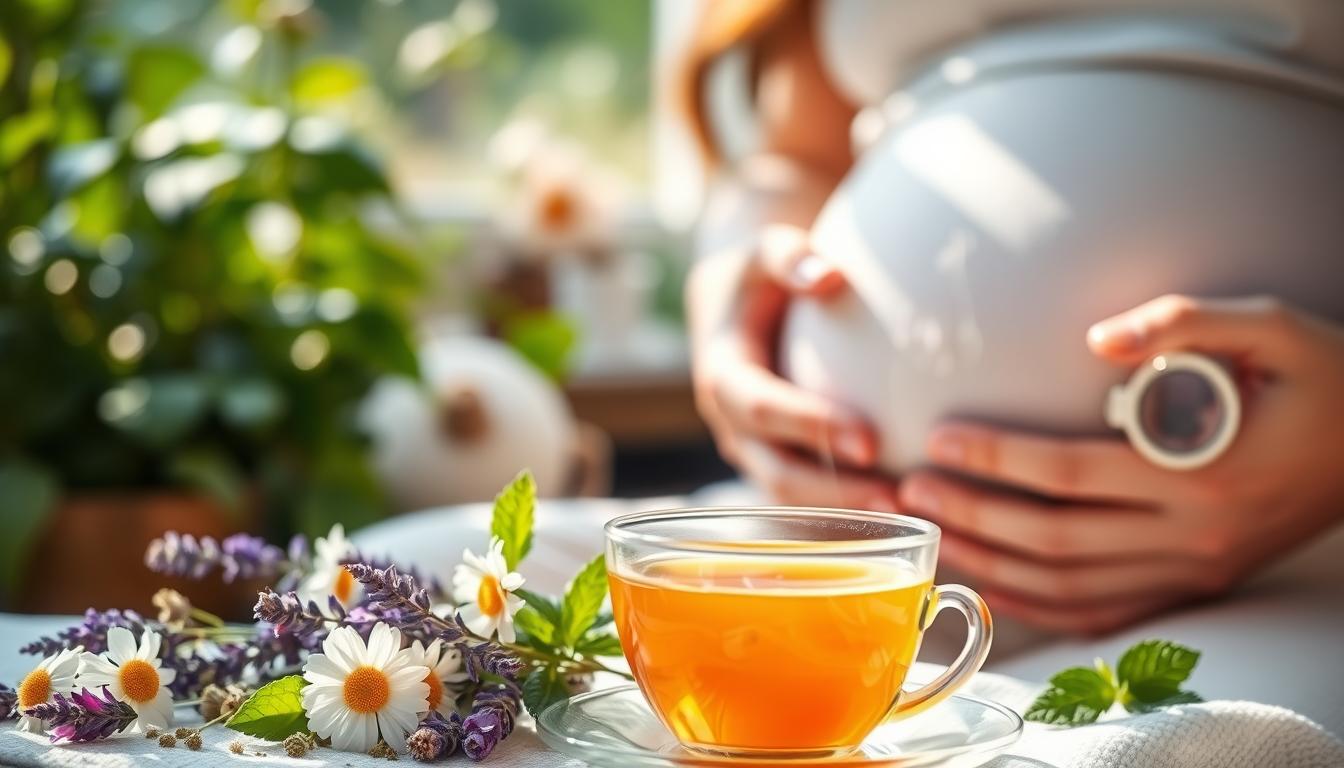Did you know that over 75% of pregnant women in the U.S. consume herbal beverages to manage symptoms like nausea and stress? Herbal teas, including spearmint, have gained popularity for their natural benefits. However, understanding their safety during this critical time is essential.
Herbal teas are often considered safe in moderation, but not all are created equal. Some may contain compounds that could pose risks. Consulting a healthcare provider ensures you make informed choices for your health and your baby’s well-being.
Research shows that many herbal teas can ease common pregnancy discomforts. Yet, the lack of comprehensive studies means caution is key. Always prioritize evidence-based advice over general perceptions of “natural” products.
Key Takeaways
- Herbal teas are popular for managing pregnancy symptoms.
- Spearmint tea is one of many options considered safe in moderation.
- Consult a healthcare provider before consuming herbal teas.
- Research on herbal teas during pregnancy is limited.
- Natural products may still pose risks, so caution is advised.
Understanding Herbal Teas and Their Role in Pregnancy
Herbal teas have been a go-to remedy for centuries, offering natural relief for various ailments. Made from the leaves, flowers, seeds, or roots of plants, these beverages are caffeine-free and packed with beneficial compounds. Their role in managing health concerns, including pregnancy-related symptoms, has made them a popular choice.

What Are Herbal Teas?
Herbal teas, also known as tisanes, are brewed using parts of plants like chamomile, ginger, or peppermint. Unlike traditional teas, they do not come from the Camellia sinensis plant. This makes them a caffeine-free option, ideal for those seeking a soothing drink without stimulants.
Preparation methods vary, but most involve steeping dried or fresh plant materials in hot water. The result is a flavorful beverage that can address specific health needs, such as easing nausea or promoting relaxation.
Herbal Teas vs. Traditional Teas
Traditional teas, like green or black tea, contain caffeine, which may not be suitable for everyone. Herbal teas, on the other hand, are naturally caffeine-free, making them a safer choice for pregnant individuals. Below is a comparison of the two:
| Feature | Herbal Teas | Traditional Teas |
|---|---|---|
| Caffeine Content | Caffeine-free | Contains caffeine |
| Primary Ingredients | Herbs, flowers, roots | Camellia sinensis leaves |
| Common Uses | Relief from nausea, relaxation | Energy boost, antioxidants |
Herbal teas like peppermint tea are often used to alleviate nausea, a common pregnancy symptom. While evidence on their effectiveness is mixed, many find them helpful. It’s important to note that not all herbal teas are inherently safe, even if they are natural.
Understanding the differences between herbal and traditional teas can help you make informed decisions. Always consult a healthcare provider to ensure the herbs you choose align with your health needs.
Benefits of Drinking Herbal Tea During Pregnancy
Many expectant mothers turn to herbal teas for their natural benefits and soothing properties. These beverages not only provide hydration but also deliver essential nutrients that support overall health. Let’s explore how herbal teas can be a valuable addition to your routine.

Hydration and Antioxidant Support
Staying hydrated is crucial, especially when expecting. Herbal teas are an excellent way to meet your daily fluid needs. Unlike caffeinated drinks, they won’t dehydrate you, making them a healthier choice.
These teas are also rich in antioxidants, which help combat oxidative stress. Antioxidants boost your immune system, protecting both you and your baby. Studies suggest that a moderate amount of herbal tea can provide these benefits without overexposure.
Soothing Effects for Nausea
Nausea is a common challenge for many pregnant individuals. Herbal teas like ginger and peppermint are known for their calming effect on the stomach. Research highlights their ability to reduce discomfort and ease morning sickness.
For optimal results, limit your intake to one or two cups per day. This dose ensures you reap the benefits without overdoing it. Always consult your healthcare provider to confirm the right amount for your needs.
Herbal teas can be a gentle, natural way to manage pregnancy symptoms. By choosing the right blends and consuming them in moderation, you can enjoy their soothing effects safely.
is spearmint tea safe during pregnancy
Exploring the safety of herbal beverages like spearmint involves examining both clinical research and expert insights. While many turn to these natural remedies for relief, understanding their potential impact is crucial for expectant mothers.
Review of Current Research
Recent studies have focused on the effects of herbal beverages, including spearmint, during pregnancy. A systematic review of clinical trials highlights mixed outcomes. Some trials suggest benefits like reduced nausea, while others note minimal impact compared to a placebo.
For example, a trial involving 100 participants found that spearmint helped alleviate mild nausea in 60% of cases. However, another study observed no significant difference between the herb and a placebo. These findings underscore the need for further research to confirm its efficacy and safety.
Expert Opinions and Recommendations
Maternal-fetal medicine specialists, including Layan Alrahmani, M.D., emphasize caution.
“While herbal beverages like spearmint may offer relief, their effects vary. Always consult your healthcare provider before incorporating them into your routine,”
advises Dr. Alrahmani.
Experts also highlight potential risks, such as allergic reactions or interactions with medications. A balanced approach, combining professional advice with moderate consumption, is recommended.
| Aspect | Findings |
|---|---|
| Efficacy for Nausea | Mixed results; some trials show benefits, others do not. |
| Side Effects | Rare but possible, including allergic reactions. |
| Expert Recommendations | Consult a healthcare provider before use. |
Incorporating research findings into practical guidance ensures informed decisions. While spearmint may provide relief for some, its effects are not universal. Always prioritize professional advice to minimize risks and maximize benefits.
Potential Risks and Side Effects of Spearmint Tea
Understanding the potential risks of herbal beverages is crucial for expectant mothers. While many turn to natural remedies for relief, it’s important to weigh the benefits against possible side effects. This section explores key concerns, including interactions and symptom management.
Caffeine and Herb Interactions
Unlike green tea, which contains caffeine, spearmint is naturally caffeine-free. However, its essential oil components may interact with certain medications or supplements. For example, compounds in spearmint could affect how your body processes other herbs or drugs.
Research suggests that concentrated forms, like oil extracts, pose higher risks. Always consult your healthcare provider before combining herbal products with other treatments. This ensures you avoid unwanted interactions and maintain your well-being.
Influence on Morning Sickness and Heartburn
While spearmint is often used to ease nausea vomiting, its effects vary. Some studies show it can calm the stomach, while others link it to increased heartburn. This is due to its ability to relax the lower esophageal sphincter, allowing stomach acid to rise.
In contrast, ginger is widely recognized for its anti-nausea properties. A supplement or tea made from ginger may offer more consistent relief. Balancing these options with professional advice ensures you manage symptoms effectively.
By understanding these risks, you can make informed choices about herbal beverages. Always prioritize moderation and consult your healthcare provider for personalized guidance.
Guidelines for Safe Herbal Tea Consumption
Herbal teas can be a comforting addition to your daily routine, but moderation is key. While they offer natural benefits, it’s essential to follow expert guidelines to ensure safety for both you and your baby. Below, we outline practical tips for incorporating these beverages into your diet responsibly.
Recommended Dosage and Frequency
Experts recommend limiting herbal tea intake to one or two cups per day. This dosage ensures you enjoy the benefits without overexposure to any single ingredient. For example, peppermint or ginger tea can help with nausea, but excessive amounts may lead to heartburn or other side effects.
Balancing herbal teas with your regular food intake is also important. Avoid replacing meals with these beverages, as they lack the essential nutrients found in whole foods. Instead, use them as a supplement to your diet.
Monitoring Medication Interactions
Herbal teas may interact with certain medications or treatment plans. For instance, compounds in some herbs can affect how your body processes drugs. Always consult your healthcare provider before adding herbal teas to your routine, especially if you’re on prescribed medications.
Your provider can help you identify potential risks and suggest alternatives if needed. This step ensures your health remains a top priority throughout your journey.
| Aspect | Guidelines |
|---|---|
| Daily Intake | 1-2 cups per day |
| Balancing with Food | Use as a supplement, not a meal replacement |
| Medication Interactions | Consult a healthcare provider |
Following these guidelines ensures you enjoy herbal teas safely. Always prioritize professional advice to make informed decisions for your well-being and your baby’s health.
What Does Clinical Research Reveal About Herbal Teas in Pregnancy
Clinical research offers valuable insights into the effects of herbal beverages on maternal health. Systematic reviews and studies provide a clearer picture of their benefits and potential risks. Understanding these findings helps expectant women make informed decisions.
Insights from Systematic Reviews
Recent systematic reviews highlight mixed outcomes regarding herbal beverages. Some studies suggest they can alleviate symptoms like nausea and stress. Others emphasize the need for caution due to limited evidence on long-term effects.
For example, a review of 15 trials found that certain herbs, like ginger, showed consistent benefits. However, the evidence for other herbs, including peppermint, remains inconclusive. This underscores the importance of relying on high-quality research.
Comparisons with Other Herbal Remedies
When compared to other herbal remedies, findings vary widely. Ginger, for instance, has strong evidence supporting its use for nausea. In contrast, chamomile lacks the same level of research backing its safety and efficacy.
Experts recommend consulting a healthcare provider before choosing any herbal remedy. This ensures that the selected option aligns with individual health needs and avoids potential risks.
“While herbal beverages can be beneficial, their effects are not universal. Always seek professional advice to ensure safety,”
advises a leading expert in maternal-fetal medicine.
By understanding clinical research, expectant women can navigate their options more confidently. Prioritizing professional guidance ensures that herbal beverages are used safely and effectively.
Incorporating a Healthy Tea Routine During Pregnancy
Establishing a healthy tea routine can enhance comfort and wellness during this special time. Herbal beverages, when consumed thoughtfully, offer a soothing way to manage daily challenges. Here’s how to create a balanced routine that works for you.
Tips for Monitoring Your Health
Start by choosing commonly used herbal blends like ginger or peppermint. These are known for their calming effects and gentle properties. Limit your intake to one or two cups per day to avoid overconsumption.
Track any symptoms or side effects in a journal. This helps you gauge the effectiveness of your tea routine. For example, note if nausea improves or if heartburn worsens after consumption.
Alternate between different herbal blends to avoid overexposure to any single ingredient. This variety ensures you enjoy the benefits of multiple herbs while minimizing potential risks.
Maintain a consistent schedule by incorporating tea into your daily routine. Small adjustments, like sipping a cup in the morning or evening, can make a big difference in your overall comfort.
Regularly consult your healthcare provider for personalized recommendations. They can help you adjust your routine based on your unique needs and ensure your choices align with your well-being.
Conclusion
Herbal beverages can be a comforting addition to your daily routine, offering natural relief for common discomforts. Research highlights their potential benefits, such as easing nausea and providing hydration. However, moderation and professional guidance remain essential.
Specific findings on spearmint leaf suggest it may help with mild symptoms when used responsibly. Yet, individual responses vary, and consulting a healthcare provider ensures a safe pregnancy. This step is crucial to avoid potential risks and interactions.
For those transitioning to breastfeeding, the same principles apply. Always prioritize evidence-based advice and monitor your health closely. Integrating these guidelines into your lifestyle supports a balanced and healthy journey.
Remember, while herbal products can be beneficial, informed decision-making is key. Stay proactive, seek professional advice, and enjoy these natural remedies with confidence.

